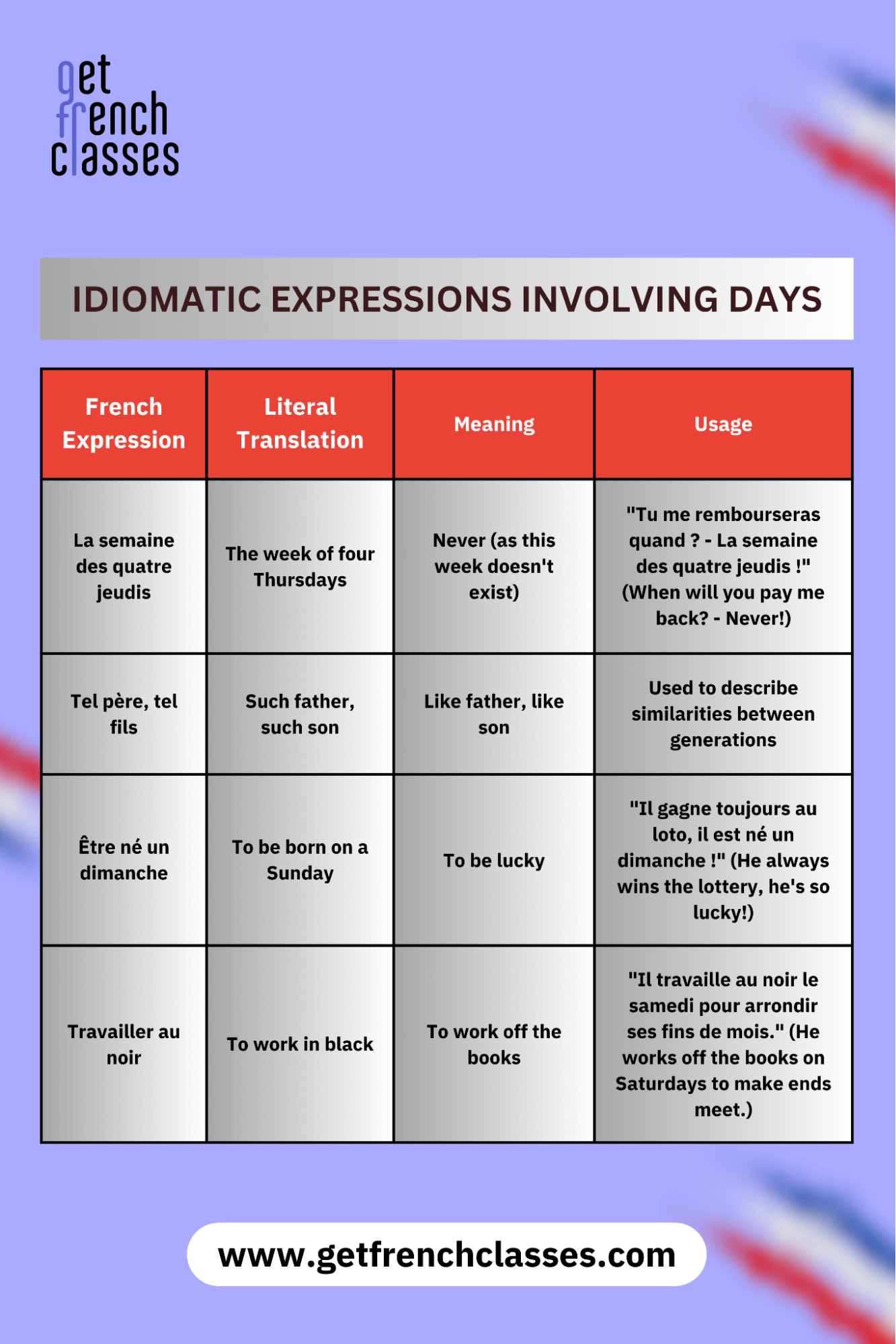Days of the week in French are the building blocks of everyday conversations, helping you navigate schedules, make plans, and understand the rhythm of life in French-speaking cultures.
The French calendar uniquely starts the week on Monday, unlike the American practice of starting on Sunday.
In this article, you’ll learn how to say the days of the week in French and how to use them in your storytelling.
The Basics: Days of the week in French
Before we dive into the various ways to use the days of the week in French, let’s start with the fundamentals. The suffix '-di' in the days of the week comes from the Latin word 'dies', meaning 'day'.
Knowing how to pronounce each of the seven days correctly and understanding some key grammar points will help you develop your language skills and set you up for success in your French language learning journey. Each day of the week in French is associated with a specific Roman god, such as Mars for Tuesday and Jupiter for Thursday.
List of days of the week in French with pronunciation guide

Here’s a table showing each day of the week in French, along with its English equivalent and a pronunciation guide:

| English | French | Pronunciation |
|---|---|---|
| Monday | lundi | lun-dee |
| Tuesday | mardi | mar-dee |
| Wednesday | mercredi | mer-cruh-dee |
| Thursday | jeudi | zhuh-dee |
| Friday | vendredi | van-druh-dee |
| Saturday | samedi | sa-muh-dee |
| Sunday | dimanche | dee-mansh |
Remember, French pronunciation emphasizes each syllable equally. Practice saying each day aloud, making sure to articulate each syllable clearly.
The names of the days of the week in French are derived from Roman gods and planets, which can help with memorization.
Don’t forget that as in english, french week starts with Lundi (french monday).
Then you have an idea why idiomatic expressions like “je déteste le lundi” whose adaptation in english is “I hate Mondays” exist in French language.
Key grammar points (masculine gender, no capitalization)
When using days of the week in French, keep these important grammar rules in mind:
-
Masculine gender: All days of the week in French are masculine. This means you’ll use masculine articles and adjectives with them.
For example:
-
le lundi ( the french Monday )
-
un mardi ensoleillé ( a sunny Tuesday )
2. No capitalization: In French, unlike in English, the days of the week are not written with capital letters unless they appear at the beginning of a sentence. So you only capitalize days in French when they start a sentence.
For example:
-
Je travaille le mercredi. ( I work on Wednesdays. )
-
Samedi, nous allons au cinéma. ( On Saturday, we’re going to the movies. )
3. Using “le” for habitual actions: When talking about things that happen regularly on a certain day, use “le” before the day.
For example:
-
Le dimanche, je fais la grasse matinée. ( On Sundays, I sleep in. )
Additionally, 'dimanche' (Sunday) originates from the Latin 'dies Dominica', meaning 'the Lord's Day'.
4. Omitting articles for the near future: When talking about a specific, upcoming day, you can omit the article.
For example:
-
Je pars vendredi. ( I’m leaving on Friday. )
5. Using “en” for emphasis: To emphasize a particular day, you can use “en” before the day of the week.
For example:
-
En lundi, je suis toujours fatigué. (On Mondays, I’m always tired.)
How to use days of the week in French: 8 essential contexts
Now that you're familiar with the basics, let's explore various contexts where you'll use days of the week in French. Understanding these different scenarios will help you communicate more effectively in a wide range of situations.
Formal expressions to say the days of the week in French
In formal settings, such as business meetings or official correspondence, it's important to use more polite and structured language. Here are some formal expressions using days of the week:
| French | English | Context |
|---|---|---|
| La réunion est prévue pour le lundi 15 mai. | The meeting is scheduled for Monday, May 15th. | Scheduling a business meeting |
| Veuillez confirmer votre disponibilité pour le mercredi prochain. | Please confirm your availability for next Wednesday. | Requesting confirmation for an appointment |
| Nos bureaux sont fermés le dimanche. | Our offices are closed on Sundays. | Stating business hours |
| Le rapport doit être soumis au plus tard le vendredi 30 juin. | The report must be submitted no later than Friday, June 30th. | Setting a deadline |
Casual everyday ways to say the days of the week in French
In informal situations with friends, family, or colleagues you're close to, you can use more relaxed expressions. Here are some examples:
| French | English | Context |
|---|---|---|
| On se voit samedi ? | Shall we meet on Saturday? | Making plans with friends |
| Je déteste les lundis ! | I hate Mondays! | Expressing feelings about a day |
| Mardi, c'est soirée cinéma. | Tuesday is movie night. | Talking about regular activities |
| T'es libre jeudi soir ? | Are you free Thursday evening? | Checking availability casually |
Asking and answering about schedules
Being able to inquire about and respond to questions regarding schedules is crucial. Here are some common phrases:
| French | English | Context |
|---|---|---|
| Quel jour sommes-nous aujourd'hui ? | What day is it today? | Asking about the current day |
| Quel jour te convient le mieux ? | Which day suits you best? | Asking for preference |
| Je suis disponible mardi et jeudi. | I'm available on Tuesday and Thursday. | Stating availability |
| Le cours de français a lieu tous les mercredis. | The French class takes place every Wednesday. | Describing a recurring event |
When answering questions about schedules, remember to use the appropriate prepositions:
-
Use "le" for specific French days: Le lundi, je travaille. (On Mondays, I work.)
-
Omit the article for the near future: Je pars vendredi. (I'm leaving on Friday.)
-
Use "tous les" for recurring events: Je fais du sport tous les samedis. (I exercise every Saturday.)
Practice these phrases to become more comfortable discussing schedules and making plans in French.
Talking about routines
When discussing daily or weekly routines in French, you'll often use the days of the week. Here are some common expressions:

| French | English | Context |
|---|---|---|
| Le lundi, je commence tôt. | On Mondays, I start early. | Describing a regular Monday routine |
| Tous les mardis, je vais à la gym. | Every Tuesday, I go to the gym. | Talking about a weekly activity |
| Le week-end, je fais la grasse matinée. | On weekends, I sleep in. | Describing weekend habits |
When discussing daily or weekly routines in French, you’ll often use the days of the week. Listening to French songs that focus on the days of the week can be an effective way to master pronunciation and enhance language acquisition. Here are some common expressions:
Discussing plans and events

When talking about future plans or events, you'll often need to mention specific french days. Here's how:
| French | English | Context |
|---|---|---|
| La fête aura lieu samedi prochain. | The party will take place next Saturday. | Informing about an upcoming event |
| Je pars en vacances vendredi. | I'm going on vacation on Friday. | Sharing travel plans |
| On se retrouve dimanche pour le brunch ? | Shall we meet on Sunday for brunch? | Making plans with friends |
Expressing preferences about certain days
Everyone has favorite and least favorite days. Here's how to express these preferences in French:
| French | English | Context |
|---|---|---|
| J'adore les vendredis ! | I love Fridays! | Expressing enthusiasm for a day |
| Je n'aime pas trop les lundis. | I don't really like Mondays. | Sharing a dislike for a day |
| Le dimanche est mon jour préféré. | Sunday is my favorite day. | Stating a preference |
Using french days in dates
When giving or asking for specific dates in French, you'll often include the day of the week. Here's how:
| French | English | Context |
|---|---|---|
| Le mardi 15 mai | Tuesday, May 15th | Stating a specific date |
| Quel jour tombe le 14 juillet cette année ? | What day does July 14th fall on this year? | Asking about a date |
| Le concert est prévu pour le samedi 3 juin. | The concert is scheduled for Saturday, June 3rd. | Providing event information |
Remember, in French dates, the day comes before the month: "le [jour] [numéro] [mois]".
Idiomatic expressions involving days

French has several idiomatic expressions that use french days of the week. These can add color to your speech and help you sound more native-like:
| French Expression | Literal Translation | Meaning | Usage |
|---|---|---|---|
| La semaine des quatre jeudis | The week of four Thursdays | Never (as this week doesn't exist) | "Tu me rembourseras quand ? - La semaine des quatre jeudis !" (When will you pay me back? - Never!) |
| Tel père, tel fils | Such father, such son | Like father, like son | Used to describe similarities between generations |
| Être né un dimanche | To be born on a Sunday | To be lucky | "Il gagne toujours au loto, il est né un dimanche !" (He always wins the lottery, he's so lucky!) |
| Travailler au noir | To work in black | To work off the books | "Il travaille au noir le samedi pour arrondir ses fins de mois." (He works off the books on Saturdays to make ends meet.) |
These expressions can be challenging to translate literally, but they add richness to your French conversations. Practice using them in context to become more fluent and expressive in French.
Cultural insights: Days of the week in French-speaking countries

Let's explore some key aspects of daily and weekly life in these countries.
Work week structure
The work week structure in most French-speaking countries is similar to many Western nations, but with some notable differences:
-
Standard work week : Typically runs from Monday (lundi) to Friday (vendredi).
-
Work hours: The traditional French workday is from 9:00 AM to 6:00 PM, with a long lunch break.
-
35-hour work week : In France, the legal work week is 35 hours, though many people work longer.
-
" Faire le pont ": When a public holiday falls on a Tuesday or Thursday, many French workers will "faire le pont" (make the bridge), taking off the Monday or Friday to create a 4-day weekend.
-
August vacation : Many businesses in France close or operate with reduced staff in August, as this is a popular vacation month.
| French | English | Context |
|---|---|---|
| Je travaille du lundi au vendredi. | I work from Monday to Friday. | Describing work schedule |
| On fait le pont ce week-end. | We're making it a long weekend. | Explaining a 4-day weekend |
| En août, le bureau est fermé. | In August, the office is closed. | Mentioning summer holiday closure |
Weekend customs

Weekends in French-speaking countries often involve specific customs and activities:
-
Saturday (samedi): Often a day for shopping, running errands, or socializing.
-
Sunday (dimanche): Traditionally a day of rest. Many shops and businesses are closed, especially in smaller towns.
-
Family time: Weekends are often reserved for family gatherings, particularly Sunday lunches.
-
Markets: Many towns host outdoor markets on Saturday or Sunday mornings.
-
Cultural activities: Museums often offer free or reduced entry on the first Sunday of each month.
| French | English | Context |
|---|---|---|
| Le dimanche, on déjeune en famille. | On Sundays, we have lunch with the family. | Describing a weekend tradition |
| Samedi matin, je vais au marché. | Saturday morning, I go to the market. | Mentioning a weekend activity |
| Le premier dimanche du mois, les musées sont gratuits. | On the first Sunday of the month, museums are free. | Explaining a cultural custom |
Common activities associated with specific days
Certain french days of the week are often associated with particular activities in French-speaking cultures:
-
Monday (lundi): Often seen as a fresh start, many people begin new diets or exercise routines on Mondays.
-
Wednesday (mercredi): In France, many schools have a half-day or day off, so it's often associated with children's activities.
-
Thursday (jeudi): A popular day for socializing after work, especially among young professionals.
-
Friday (vendredi): Often celebrated as the start of the weekend, with after-work drinks or "apéro" being common.
-
Sunday (dimanche): Traditionally a day for family meals, relaxation, and in some cases, attending church.
| French | English | Context |
|---|---|---|
| Le mercredi, les enfants ont leurs activités extrascolaires. | On Wednesdays, children have their extracurricular activities. | Explaining a common schedule for children |
| Jeudi, c'est soirée entre collègues. | Thursday is colleagues' night out. | Describing a social custom |
| Le vendredi soir, on prend l'apéro pour commencer le week-end. | On Friday evening, we have drinks to start the weekend. | Mentioning a popular end-of-week tradition |
Days of the week in French FAQ: Quick answers to common questions
Here are some frequently asked questions about days of the week in French, along with their answers:
Are days of the week capitalized in French?

No, unlike in English, days of the week are not capitalized in French unless they appear at the beginning of a sentence.
How do you abbreviate days of the week in French?

French days of the week are typically abbreviated as follows:
-
lundi -> lun
-
mardi -> mar
-
mercredi -> mer
-
jeudi -> jeu
-
vendredi -> ven
-
samedi -> sam
-
dimanche -> dim
What's the origin of French day names?
Most French days' names have Roman and quite religious origins, derived from Latin names of planets or gods:
-
lundi (Moon day)
-
mardi (Mars day)
-
mercredi (Mercury day)
-
jeudi (Jupiter day)
-
vendredi (Venus day)
-
samedi (Saturn day)
-
dimanche (Lord's day)
How do you say "weekend" in French?
The French word for weekend is "le week-end" (pronounced "week-end" with a French accent) or "la fin de semaine" in Quebec French.
How do you ask "What day is it today?" in French?
You can ask, "Quel jour sommes-nous ?" or "Quel jour est-on aujourd'hui ?"
How do you say "every Monday" or "every Tuesday" etc. in French?
Use "tous les" before the day: "tous les lundis" (every Monday), "tous les mardis" (every Tuesday), etc.
Is there a difference between "on Monday" and "on Mondays" in French?
Yes. "On Monday" (a specific Monday) is "lundi" without an article. "On Mondays" (every Monday) is "le lundi" or "les lundis."
How do you say "next Monday" or "last Tuesday" in French?
Use "prochain" for next and "dernier" for last:
-
lundi prochain (next Monday)
-
mardi dernier (last Tuesday)
Are there any sayings or superstitions about specific days in French culture?
Yes, for example:
-
"Tel qui rit vendredi, dimanche pleurera" (He who laughs on Friday will cry on Sunday) - meaning fortunes can quickly change.
-
In some regions, it's considered unlucky to get married on a Tuesday or start a journey on a Friday.
How do you say "working days" and "weekdays" in French?
Learning french or other languages, you'll come up with french words or phrases like working days and weekdays. "Working days" is "jours ouvrables," and "weekdays" (Monday to Friday) is "jours de la semaine" or "jours ouvrés."
